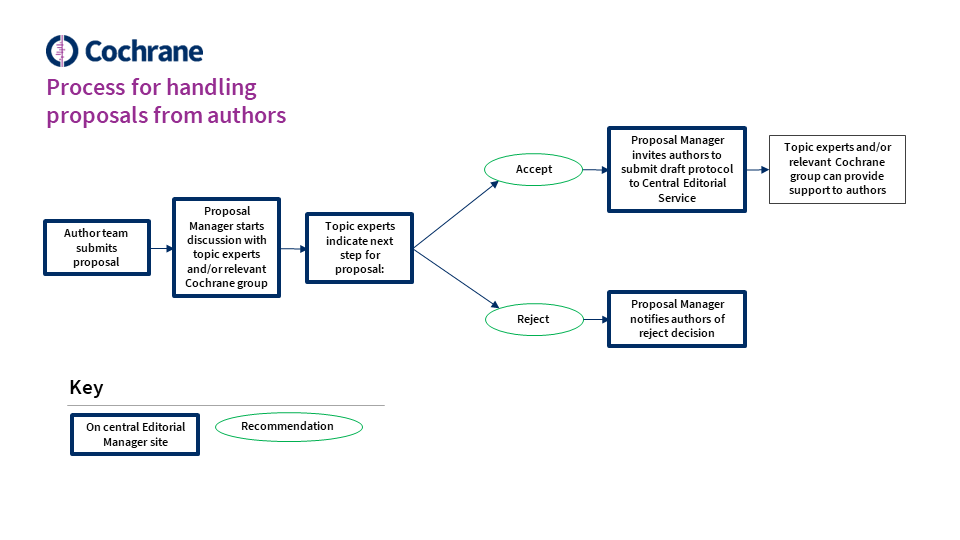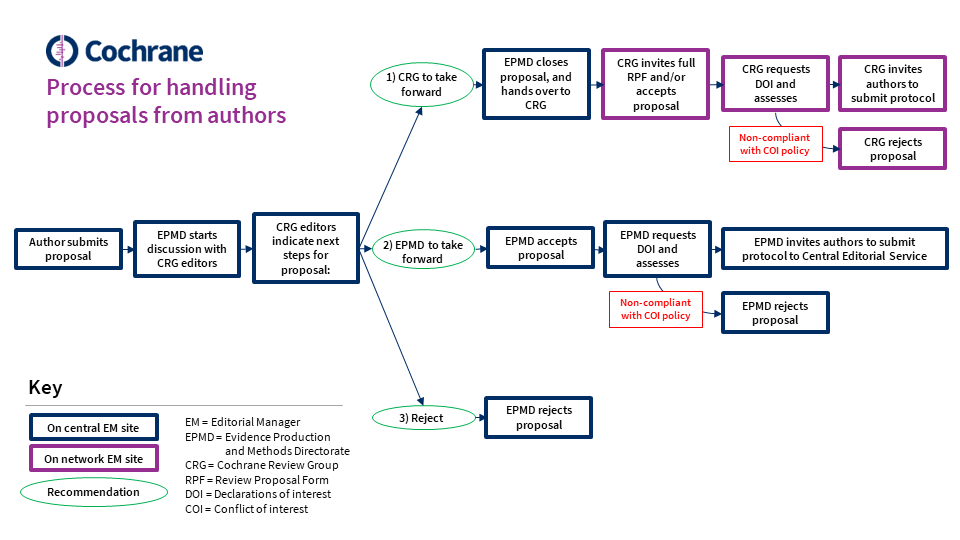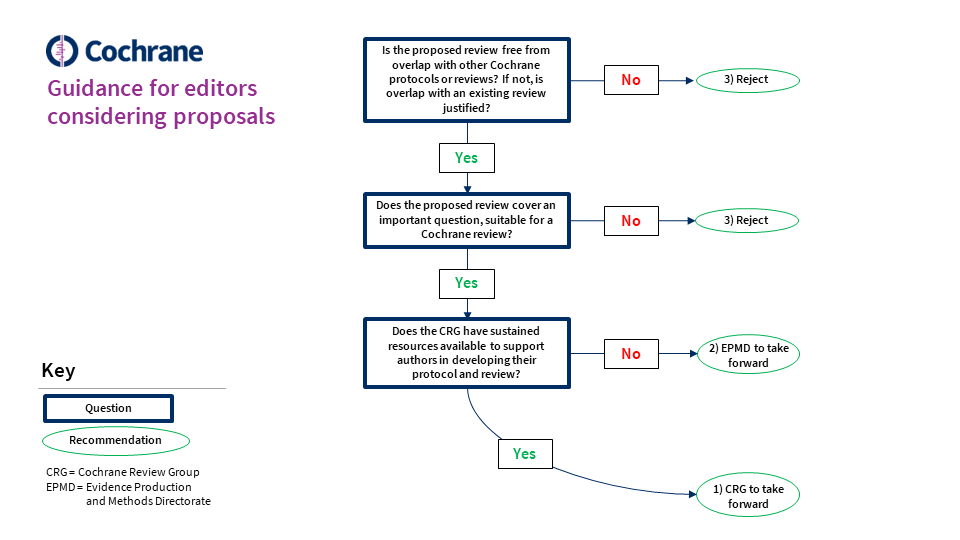| Table of Contents |
|---|
Process for
...
handling review proposals
...
1.
...
Initial process
Proposal submission
Authors submit a proposal to conduct a new Cochrane Review to the central Editorial Manager site.
...
2. PICO screening
The Evidence Pipeline team screen PICO of the proposed review to help in identifying overlap with existing Cochrane Reviews and gaps in the evidence (see ‘Guidance’ item 2, below).
3. Discussion and assessment
The Proposal Manager initiates a ‘Discussion’ on the central Editorial Manager site, inviting
...
topic experts to assess the proposal.
- The CRG’s Co-ordinating Editor, Managing Editor, Assistant Managing Editor, Information Specialist, and any other editors nominated by the CRG Topic experts nominated by a Cochrane group can be involved in discussions. To nominate additional members from a CRG to be involved participants in proposal discussions, please email support@cochrane.org with the person’s details (name, email address, affiliated CRGCochrane group). If relevant, specifying please specify whether the person will be involved in assessing assess proposals covering specific topics only, and the names/provide keywords for the topics they will consider.
4. Decision to accept or reject
Participants in the discussion will
...
make a decision to accept or reject the proposal.
- An accept decision means that the authors will be invited to submit a draft protocol to Cochrane Central Editorial Service.
- The acceptance of a proposal is not a guarantee of protocol publication.
- Please note that authors should not be requested to revise their proposal. If it is not possible to evaluate the proposal based on the information provided, discussion participants should recommend a reject decision. They may also provide brief feedback for the authors if preferred.
5. Support for authors
After reaching a decision to accept, the topic experts can indicate their ability to provide support to the authors during the protocol development process.
6. High-profile reviews
Topic experts are also asked to flag whether
...
the proposed article could be a high-profile or controversial review. In these cases,
...
the Proposal Manager will contact the Cochrane
...
Review Development team and the
...
Communications team about potential support for the authors.
...
Guidance for topic editors assessing proposals
| Info | ||
|---|---|---|
| ||
| Within Editorial Manager, topic experts are asked to consider the following questions when assessing proposals toward a decision to accept or reject: |
1. Does the proposed review cover an important question, suitable for a Cochrane Review?
Topic experts may determine that a proposal is not of importance to the Cochrane Library’s audiences, or that the question does not lend itself to being answered by a systematic review. In these cases, the proposal should be rejected.
2.
Further process according to option selected
1. CRG to take forward
- EPMD closes the proposal on the central Editorial Manager site and informs the authors by email (copying in the CRG editors and attaching the full proposal) that the CRG will contact them about their proposal.
- Once the CRG receives the email from EPMD to authors, the CRG either:
- invites the authors to submit a full Review Proposal Form (RPF) to their network Editorial Manager site and assesses the RPF as usual; or
- generates and accepts the proposal without an RPF on their network Editorial Manager site.
- Accepting the proposal generates a protocol in RevMan, 'registered' with the CRG.
- The CRG requests that authors submit their declarations of interest forms via Editorial Manager. On submission of the forms, the CRG assesses whether the author team is in compliance with the Conflict of Interest (CoI) Policy for Cochrane Library Content.
- If the author team is not in compliance, the ME rejects the proposal and emails the authors informing them of the rejection.
- The CRG then invites the authors to submit the protocol to their network Editorial Manager site.
2. EPMD to take forward
- EPMD ensures the section category in Editorial Manager is 'EPMD' and accepts the proposal.
- Accepting the proposal generates a protocol in RevMan, ‘registered’ with EPMD.
- EPMD requests that the authors submit their declarations of interest forms via Editorial Manager. On submission of the forms, EPMD assesses whether the author team is in compliance with the Conflict of Interest (CoI) Policy for Cochrane Library Content.
- If the author team is not in compliance, EPMD rejects the proposal and emails the authors informing them of the rejection.
- If the author team is in compliance, EPMD then informs the authors how to submit their protocol to the Central Editorial Service.
3. Reject the proposal
- EPMD informs the authors that their proposal has been rejected.
Guidance for editors considering proposals
Fig. 2. Summary of guidance for editors when considering proposals from authors to conduct new Cochrane Reviews.
Background
When CRG editors are invited to a proposal ‘Discussion’ on the central Editorial Manager site, they are asked to select one of the following options, with brief rationale:
- CRG to take forward
- EPMD to take forward
- Reject the proposal
What to consider
Please consider the following factors when determining which option to select:
Is the proposed review free from overlap with other Cochrane Reviews or protocols? If not, is overlap with an existing review justified?
Would the proposed review add to the evidence base in this topic area?
The results of the Evidence Pipeline team PICO screening will be available within Editorial Manager to help topic experts evaluate whether gaps in the evidence exist that are sufficient enough to justify overlap with existing Cochrane Library content.
If the proposal overlaps with existing content, and a new review in the same topic area is not justified (e.g. it won’t add to what is already available on the Cochrane Library), the proposal should be rejected.
Authors may indicate that overlap with existing content is justified, for example, if the review will include a newly available intervention or address a more contemporary question. In these cases, it is at the discretion of the editors to decide whether the overlap is justified. If editors consider the overlap to be justified, they should include brief details about the overlap and rationale in the discussion reply.
Does the proposed review cover an important question, suitable for a Cochrane Review?
Editors may determine that a proposal is not of importance to the Cochrane Library’s audience, or that the question does not lend itself to being answered by a systematic review. In these cases, the proposal should be rejected.
3. Would you recommend that the authors be invited to submit a draft protocol?
If the proposal covers an important question, or the importance of the question is not yet fully clear, the proposal should be taken forward . Editors can assess the question’s importance further by requesting and the authors invited to submit a Review Proposal Form and/or a completed draft protocol. Using a completed protocol to assess the question’s importance allows authors to access Cochrane tools (including RevMan) and Cochrane resources.
If on submission and full assessment of the protocol, editors deem the topic is of insufficient importance for a Cochrane Review, the methods are not appropriate for the question, or the protocol is otherwise of low quality, the protocol will be rejected.
| Info | ||
|---|---|---|
| ||
| Following a decision to accept, topic experts are also asked to consider the following opportunities for support to the authors: |
4. If you are affiliated with a Cochrane group, will your group be able to provide support to the Does the CRG have sustained resources available to support authors in developing their protocol and review?
Some CRGs have sustained funding and If you are able to support authors in developing and writing their protocol and review, whereas other CRGs do not. CRGs with sustained funding can choose to take the proposal forward to an RPF, or proceed without an RPF and invite the protocol. CRGs without sustained funding can select for EPMD to take the proposal forward, and for the protocol to be submitted to the Central Editorial Service.
Preparing for high-profile or controversial reviews
provide author support, you will be copied into the acceptance email to authors, as well as the email to authors inviting a draft protocol. This will enable authors to contact you directly if they wish to seek support.
Indicating your ability to provide author support also means that the new protocol will be listed in your group’s section in Archie.
5. Is this a high-profile review?
- Upon publication, could the review elicit substantial public attention and interest, either positive or negative?
- Has the review been funded or commissioned?
If CRG editors recommend taking forward the proposal, with either the CRG or EPMD, they will also be asked if they think the proposed article could be a high-profile or controversial review. Author teams of high-profile reviews may qualify for centralized support during the development of the protocol and review (: for example, assistance in writing or running searches, assessment of analysis and GRADE ratings prior to write-up, dedicated author support with author queries before submission).
In addition, EPMD will alert Cochrane’s central communications team the Cochrane Communications team will be alerted to the initiation of a review marked as 'high-profile review', to help to the team plan for knowledge translation dissemination activities. Authors of controversial reviews may also be offered support in handling engagement on their review.
Actions for Proposal Managers following accept and reject decisions
Accept - Cochrane group can offer author support during protocol development
- Mark the proposal as accepted in Editorial Manager to create the protocol in RevMan.
- List the protocol in the relevant Cochrane group’s section in Archie.
- Copy the Cochrane group in to the acceptance email to authors.
- Invite the authors to submit the draft protocol to Cochrane Central Editorial Service.
- Copy the Cochrane group in to the invitation email to authors, so that groups are aware of the information and guidance provided at this stage.
Accept - authors will work independently
- Mark the proposal as accepted in Editorial Manager to create the protocol in RevMan.
- List the protocol in the Central Editorial Service section in Archie.
- Invite the authors to submit the draft protocol to Cochrane Central Editorial Service.
Reject
- Notify authors of the reject decision and share any relevant feedback from topic editors.
High-profile reviews
- Notify the Review Development team and the Cochrane Communications team, to initiate support for the author team during development and to plan for potential dissemination activities.


